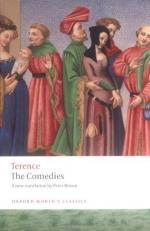|
This section contains 1,554 words (approx. 6 pages at 300 words per page) |

|
SOURCE: "Comedy: Plautus and Terence," in Latin Literature, Charles Scribner's Sons, 1895, pp. 14-26.
Mackail was an English critic, biographer, and educator whose books include The Springs of Helicon (1909) and Studies in Humanism (1938). Here, he comments on Terence's position in the history of Roman literature, noting that, while his style is not colorful, it exemplifies the best stylistic qualities of his era.
The Terentian comedy is in a way the turning-point of Roman literature. Plautus and Ennius, however largely they drew from Greek originals, threw into all their work a manner and a spirit which were essentially those of a new literature in the full tide of growth. The imitation of Greek models was a means, not an end; in both poets the Greek manner is continually abandoned for essays into a new manner of their own, and they relapse upon it when their imperfectly mastered powers of invention...
|
This section contains 1,554 words (approx. 6 pages at 300 words per page) |

|


